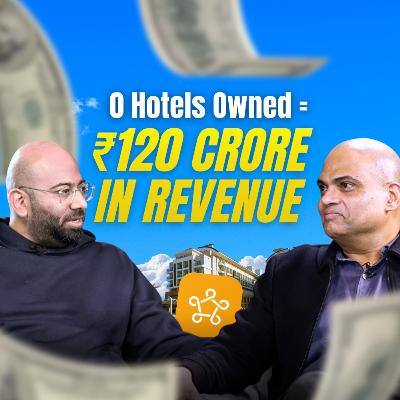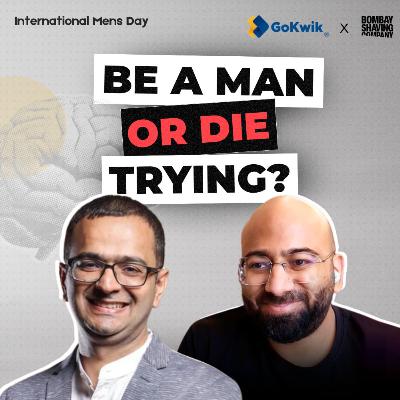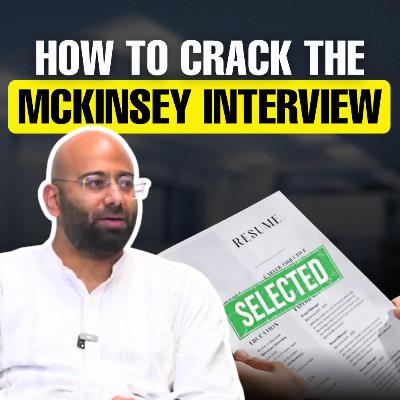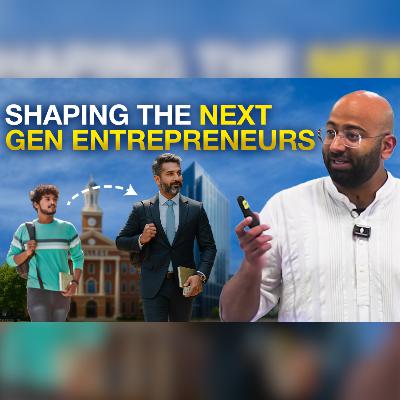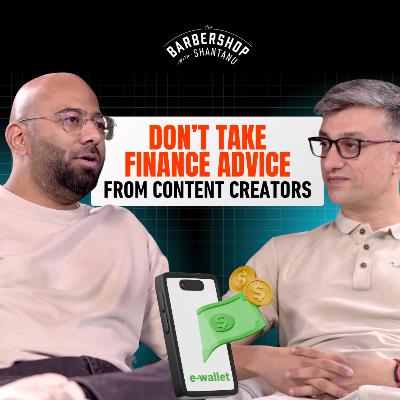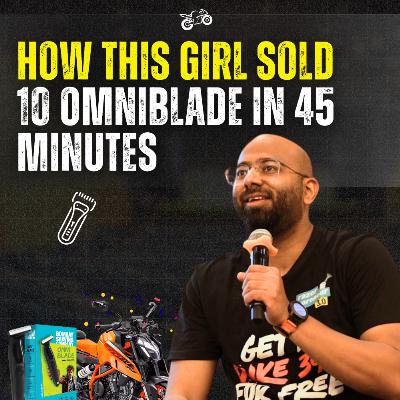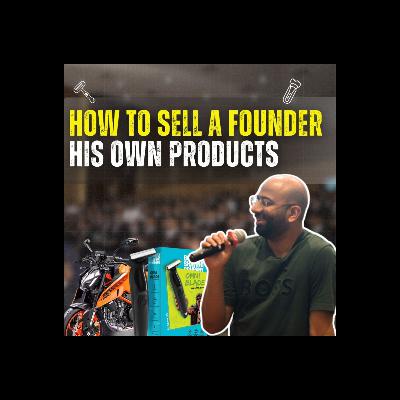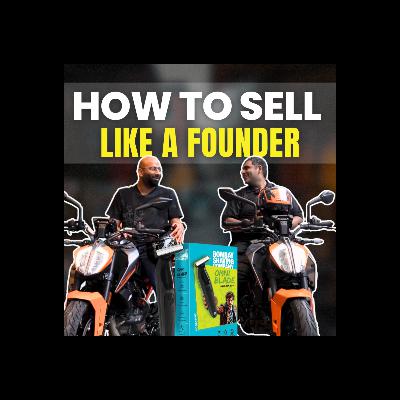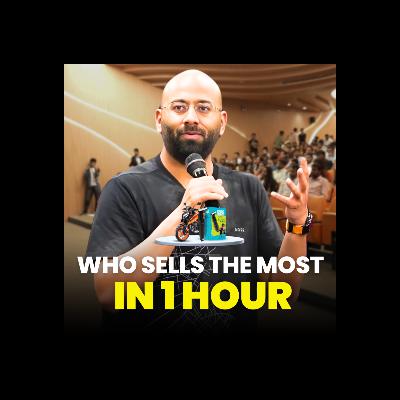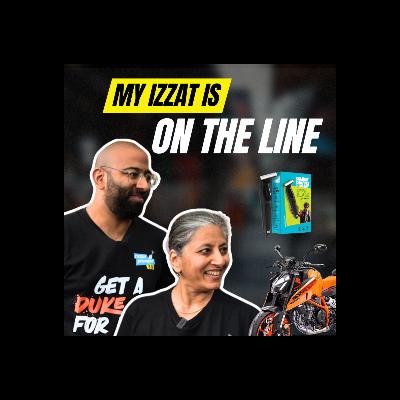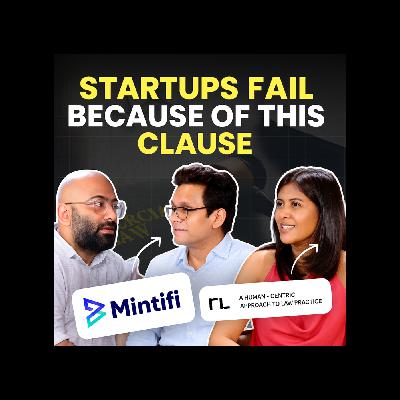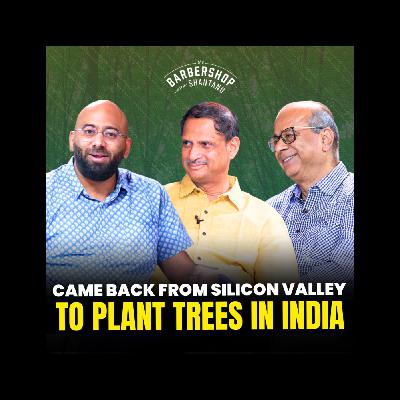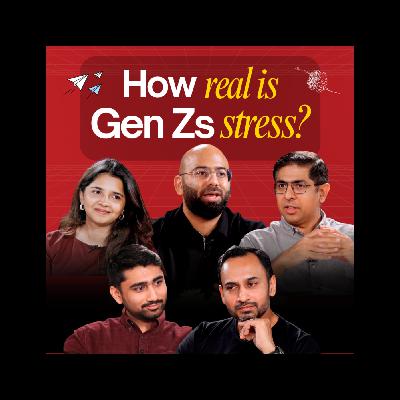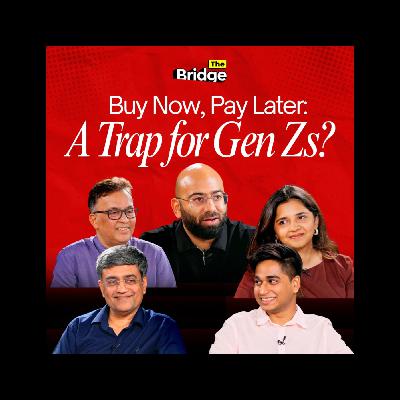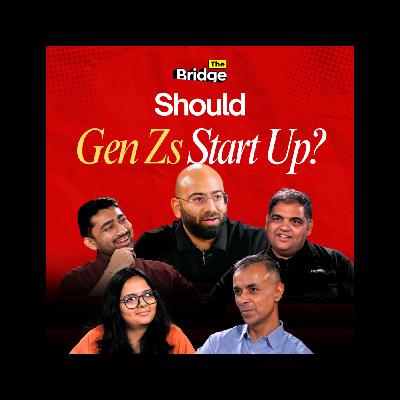Discover The BarberShop with Shantanu
The BarberShop with Shantanu

The BarberShop with Shantanu
Author: The BarberShop with Shantanu
Subscribed: 332Played: 6,233Subscribe
Share
© NA
Description
Welcome to The Barbershop with Shantanu a safe space for open, free-flowing, and insightful conversations. Shantanu, the founder of Bombay Shaving Company and Bombae, brings his passion for mentorship and storytelling to this podcast, creating a platform where ideas can grow.
Subscribe to stay tuned, and let’s grow together one hustle at a time.
126 Episodes
Reverse
What happens when two people realise India isn’t lacking luxury, but starving for togetherness?They walked away from stable careers and built a ₹120 CR hospitality brand that proves ‘luxury’ isn’t always required to succeed! In this episode of The Barbershop, Shantanu sits down with Deven Parulekar (Founder of SaffronStays), who built his brand on one simple belief: where families bond. From a honeymoon dream many years ago to a reality in 2015, this vision has expanded into a network of 425 villas, each designed to bring people closer.But here’s the part that sets this story apart: SaffronStays refuses the ‘luxury’ tag. Its heart lies in homes that feel welcoming, with villas kept ready for every moment without anyone stepping in uninvited.An unexpected call about a 130-year-old heritage home changed everything, opening the door to a vision that would one day aim to become the Taj of homestays in India. And through the years, the brand has quietly reshaped how India thinks about travel, belonging, and human connection.What you’ll discover:- Why the brand refuses to be ‘the largest’, but strives to be ‘the finest’, with a mission to combat loneliness.- How human bonds spark real business growth- How hardships during COVID-19 opened the door to unexpected success- How one historic villa changed the company’s direction- The three values that build lasting brands.If you’ve ever experienced the joy of bonding with your people, watch how a villa brand reimagined Indian hospitality by focusing on bonds, over luxury. Navigate your way through the chapters00:00 Coming Up01:44 Introduction03:28 How Deven Built SaffronStays05:42 How Hospitality Has Changed08:27 What Makes Villa Stays Special12:27 Growing and Understanding Guests16:00 How SaffronStays Stands Out19:05 How Travel Trends Affect Hotels26:14 What SaffronStays Promises Guests31:18 Villas Today and Why “Luxury” Feels Overused35:26 The First Home and Brand Journey39:44 Where Most Bookings Come From41:48 Meeting Post-COVID Guest Needs47:57 The Philosophy Behind Caretaking50:25 Using Instagram to Connect53:11 “Where Families Bond” in Action55:19 Favourite Villas and Top Picks59:22 Do Guests Come Back?1:03:25 Making Marketing Meaningful1:08:27 Advice from Shantanu1:14:02 Why They Chose the Blue Ocean1:20:40 Understanding Valuation1:24:53 How Travel Is Changing1:26:45 Closing Thoughts
Men are breaking silently, and most people do not notice until it is too late.This Men’s Day conversation brings Shantanu together with Chirag Taneja and the GoKwik team to talk about the quiet struggles that shape a man’s life.Men live shorter, visit doctors less, hide pain behind work, and carry pressure they never learned to talk about.Many grow up without strong male role models. Many lose friendships after marriage.Many feel responsible for everyone but themselves.Most of this remains unspoken because men are taught to stay strong even when strength is slipping away.In this episode, they finally say the things men usually swallow.They talk about exhaustion that has no outlet, about feeling misunderstood in rooms full of people, about why therapy often misses what men cannot put into words.Watch this if you want to understand the men in your life. Or if you are a man who has been waiting for someone to understand you.Navigate your way through these chapters:00:00 Coming Up01:00 Introduction & Opening Discussion05:05 Male Health & Mental Wellness Statistics10:14 Society's Expectations on Men14:13 Legal Frameworks & Therapy Challenges19:02 Q&A: Stereotypes About Masculinity25:15 Balancing Ambition, Career & Self-Care31:03 Financial Responsibilities & Partner Expectations37:00 Leadership & Modern Men in the Workplace41:45 Shared Values & Relationship Manifestos44:08 Men's Starter Kit for the New Generation50:00 Closing Thoughts
Scared of interviews? Maybe you're following the wrong rulebook.In this episode, Shantanu sits with a group of students to break down what interviews actually are. Not tests. Not interrogations. But human conversations where trust, honesty and connection matter far more than memorised answers.Shantanu pulls apart the fear, the overthinking, the nervousness that students walk in with, and reveals the real strategy: show up as someone your interviewer will genuinely enjoy working with.From decoding the classic McKinsey-style interview model to understanding why fun, clarity and natural communication create the strongest impression, this conversation opens up the side of interviews no one teaches in college.What you’ll discover:• Why interviews are built on connection, not perfection• How trust, honesty and humility shape your first impression• The three-part structure interviewers use to evaluate candidates• How fun, flow and real conversation shift decisions• The difference between trying to impress someone and working with someone• What interviewers actually remember after you leave the roomCan staying relaxed, real and human be the biggest interview advantage?Tune in to see Shantanu decode the mindset that helps students walk into any interview with confidence, clarity and heart.Navigate your way through these chapters00:00 Coming Up00:40 Introduction01:31 How Consulting Interviews Really Work03:06 What Interviewers Actually Look For11:40 Students Rank Top Interview Qualities16:31 The Real Interview Filter19:10 Strategy to Crack Your Dream Interview23:07 What You Think Matters vs What Actually Matters25:41 Stop Impressing, Start Showing You Can Work With Them29:41 How Shantanu Interviews & What He Notices First32:06 Lessons From Anuj Paul33:47 Closing Thoughts
In the chaos of laughter, how does a comedian think of conquering the unpredictable world of business?In this exciting episode of Barbershop, Shantanu sits down with Kenny Sebastian, who is stepping into the world of entrepreneurship with his own perfume brand, The Stage. But the twist is he’s not just launching a fragrance, but is ready to challenge big players in the market with a daring entrepreneurial debut.Kenny, known for his sharp wit and stage presence, reveals how he’s blending his passion for comedy with the art of perfume-making. Mic Check and Spotlight, the two fragrances he’s launching, aren’t just scents; they’re his personal tribute to the stage that shaped him.And to make this vision a reality, Kenny had no one but the Bombay Shaving Company team by his side. From exploring perfume branding to choosing the right mood board, BSC’s expertise has been crucial in shaping the brand.What you’ll discover:- How the BSC team helped Kenny launch his own perfume brand from scratch.- The secret behind Mic Check and Spotlight, more than just names- Why Kenny’s perfume brand could compete in both the ₹3,000+ and ₹500 price ranges.- The challenges and triumphs of blending comedy with entrepreneurship.- Can a comedian make it in the business world?Tune in to find out how Kenny’s stage persona is influencing his new venture and why The Stage is set to disrupt India’s perfume market.Navigate your way through these chapters 00:00 Coming up00:33 Introduction02:21 How Kenny started The Stage with BSC’s support06:32 Kenny x BSC team09:29 How Rohit Taneja helped launch The Stage 13:17 Why did The Stage begin with two perfumes?18:28 Naming the perfumes and how stand-up influenced the brand27:31 The role of packaging and vendors29:12 Why pricing should reflect value, not just cost32:01 Ticket pricing lessons from stand-up34:32 Premium ≠ Price 41:04 Crafting The Stage’s launch strategy45:31 Why The Stage could be India’s next big perfume brand46:43 Showcasing Mic Check and Spotlight55:21 Closing thoughts
What’s it really like to work inside one of India’s most loved D2C brands?In this episode, Shantanu visits Ashoka University to talk to students about the journey of Bombay Shaving Company - how it started, why it was built, and the values that continue to guide its growth story.From startup stories and brand-building lessons to honest conversations about risk, purpose, and culture, it’s a peek into what goes behind building a D2C brand that people truly love.Two interns also share their experiences while working at Bombay Shaving Company, the learnings, surprises, and what it’s really like behind the scenes of a fast-growing D2C business. What’s the one skill you’d love to learn from the team at Bombay Shaving Company? Tell us in the commentsNavigate your way through these chapters00:00 Coming Up00:34 How Bombay Shaving Company Started02:43 Why They Chose to Build BSC06:32 Core Values That Drive the Brand08:16 An Intern’s Experience at BSC14:55 What to Expect Ahead
No matter where you are with money, this episode is for you.In this episode, Shantanu’s college best friend Anuj takes us through his journey - from the pressures of corporate banking and quarterly targets to building My Fundbox, a financial services platform helping people like us manage, invest, and grow our money smarter.Along the way, he’s experienced all the highs and lows, cleared the mutual fund distribution exam, and is now empowering people to take control of their finances.On the pod, they talk about corporate fraud, credit card traps, insurance, and how My Fund Box is solving real problems in financial services. Plus, Anuj shares his own and his 7-year-old Adwik’s personal experience with content creation, passive income as social media influencers, and what money really means in life to them.What’s the biggest financial lesson you’ve learned so far? Share it in the comments!Navigate your way through these chapters:00:00:00 Coming Up 00:01:46 Anuj’s Early Career 00:15:42 How My Fundbox Started 00:18:11 The Dark Side of Banks 00:22:05 Investments & Insurance Truths 00:28:28 How to manage Credit Cards & Debts 00:48:25 Life Lessons & My Fundbox Vision 01:07:55 Finance Advisory, MFDs & NFOs 01:13:44 Adwik’s Fitness & Social Media Journey 01:31:04 Anuj’s Social Media Story 01:36:45 Building Passive Income 01:54:24 Banter with Adwik & Closing Thoughts
How to become a great salesperson?Confidence? Product knowledge? Or the courage to face rejection again and again?In this final episode of Razorpreneur 3.0, Shantanu dives deep into the art of selling, live at Symbiosis Institute of Management Studies, Pune.From breaking the ice to breaking records, this one is packed with hustle, wit, and raw energy.And in classic Shantanu style, it all comes down to action. A 45-minute campus challenge where students sell trimmers, face rejections, crack pitches, and learn on the go.The message is clear: real learning begins when theory meets the street.5 days left, plenty of time to jump in from zero and show what you’ve got ;)Prizes you can still win:1. Top Seller → KTM 390 Duke2. Next 6 Champions → KTM 160 Duke each3. Internship at Bombay Shaving Company4. A feature on The BarberShop with ShantanuHow to make your final push:1. Register → https://www.bombayshavingcompany.com/pages/razorpreneur3-0?utm_source=youtube&utm_medium=product_shelf2. Sell trimmers using your unique code3. Climb the leaderboard before midnight and ride away in styleWatch the episode and see how Symbiosis students turned every “no” into their next big win. Navigate your way through these chapters:00:00 Coming Up00:46 Introduction02:11 Kicking Things Off with Fun04:02 Real Questions from Future Sellers06:38 The Secret Behind Great Selling13:03 Why Omni Blade collaborated with KTM Duke20:35 The Most Overlooked Sales Hack23:18 Student Sales Hacks That Worked27:08 Student Bags Interview at BSC
What if a simple idea could start a trend? What if one spark could change the way people live, shop, and even groom themselves?In this episode of Razorpreneur 3.0, Shantanu takes us on a journey through the last decade of Indian entrepreneurship at Symbiosis Institute of International Business, Pune. He exhibit how investing in different brands transformed sellers, shaped trends, and set the stage for India’s future.He shares the story of how the beard trend took over India, and why that sparked the idea to start Bombay Shaving Company. Then, in classic Shantanu style, he turns theory into action: A 45 minute sales challenge. Students hit the campus selling trimmers, facing rejections, cracking pitches, learning on the go. This season, the pitch you make could land you the bike of your dreams!Razorpreneur 3.0 is here! The stakes are higher, the prizes hotter, and the race tougher!Prizes this season:1. Sell the most → KTM 390 Duke2. Next 6 sellers → KTM 160 Duke3. An internship at Bombay Shaving Company4. Get invited for an episode on The BarberShop with ShantanuHere’s how to jump in:1. Register → [https://www.bombayshavingcompany.com/pages/razorpreneur3-0?utm_source=youtube&utm_medium=product_shelf]2. Sell the Trimmers using your unique code3. Climb the leaderboard, win big, and ride in styleThis is your chance to sell and win KTM!Navigate your way through these chapters 00:00 Coming Up 00:47 Introduction02:02 How to Identify Product Market Fit? 05:24 Why selling is important for Entrepreneurship11:05 Omni Blade X KTM Duke 13:01 How to participate in this challenge16:20 How Britannia Campaign inspired BSC19:00 Student shaves his beard to win the KTM Duke 20:33 Winning Tips and Tricks
Every career is built on selling. Especially an entrepreneur’s! That’s what Shantanu and Ankush (Co-Founder and CEO at Rebel Foods) suggested at Narsee Monjee Institute of Management Studies, Navi Mumbai, and we couldn’t agree more.In this episode of Razorpreneur 3.0, Shantanu teams up with Ankush to bring the hustle as well as their friendship alive on campus. They kick off with a power-packed masterclass on the art of selling, showing why sales isn’t just for salespeople, but the backbone of every profession.The challenge? Students step out to sell as much as they can. Some pitches work, some get turned down, but every attempt comes with a lesson. Between all the action, Shantanu and Ankush rewind to their younger days , laughing about the bikes they used to ride and love, emphasising on the fact that today’s Razorpreneurs have a chance to win their dream bikes while perfecting the art of selling! This season, the pitch you make could win you the bike of your dreams.Razorpreneur 3.0 is here! The stakes are higher, the prizes hotter, and the race tougher:1. Sell the most → KTM 390 Duke2. Next 6 sellers → KTM 160 Duke3. An internship at Bombay Shaving Company4. Get invited for an episode on The BarberShop with ShantanuHere’s how to jump in:1. Register → [https://www.bombayshavingcompany.com/pages/razorpreneur3-0?utm_source=youtube&utm_medium=product_shelf]2. Sell the Trimmers using your unique code3. Climb the leaderboard, win big, and ride in styleThis is your chance to sell and win KTM!Navigate your way through these chapters 00:00 Coming Up00:49 Introduction00:56 Shantanu & Ankush's college bikes story02:10 Shantanu on acquiring market gap03:26 Ankush's journey in cloud kitchens05:54 Shantanu on effective selling strategies09:16 Introduction to Razorpreneur10:13 KTM x Razorpreneur 3.0 collaboration10:50 Steps to become a Razorpreneur11:06 Prize announcement for winners13:33 How to crack D2C? 14:06 Students selling in action17:00 Razorpreneur winners from NMIMS 18:16 Shantanu wraps up the session
“Sell like your life depends upon it.”We can’t agree more with Kiran Shah! In the second episode of Razorpreneur 3.0, Shantanu teams up with Kiran Shah, Razorpreneur and founder of Go Zero. From his early days at Apsara Ice Creams to building Go Zero, Kiran shows how every big idea begins with the art of selling.At Vidyalankar Institute of Technology, the challenge heats up. Shantanu announces a one-hour contest, and students step out to sell trimmers, while Shantanu and Kiran take on the same test themselves. The campus buzzes with pitches, rejections, lessons, and wins.This season, the pitch you make could win you the bike of your dreams! Now, it’s your turn.Razorpreneur 3.0 is here! The stakes are higher, the prizes hotter, and the race tougher:- Top Seller → KTM 390 Duke- Next 6 Champions → KTM 160 Duke each- 3 Lucky Buyers → KTM 160 Duke eachHere’s how to jump in:1. Register → [https://www.bombayshavingcompany.com/pages/razorpreneur3-0?utm_source=youtube&utm_medium=product_shelf]2. Sell the Trimmers using your unique code3. Climb the leaderboard, win big, and ride in styleThis is your chance to sell and win KTM!Navigate your way through these chapters:00:00 Coming Up01:36 Introduction02:44 How can you become an entrepreneur03:47 What is Razorpreneur07:30 Team Shantanu V/S Team Kiran11:20 Winners From Vidyalankar13:56 Omni Blade X KTM
Some journeys begin at home.For the first episode of Razorpreneur 3.0, mine does too. This time, I don’t bring a founder, VC, or CEO. I bring my mom – the best salesperson I know!In this episode shot in Pune, Aai visits her everyday kirana shops and steps into the world of sales for the first time. From friendly local stores to the chaos of FC Road, she convinces complete strangers to try the Omni Blade instead of the trimmers they usually buy. She has no sales experience, feels nervous, and faces rejection. But with every “no,” she learns, discovers the power of connecting with people, and sees that energy and storytelling can turn strangers into customers.Watching Aai’s pitches get braver with every try and seeing her enjoy each small win reminded me what entrepreneurship is really about. The courage, the no-excuse attitude, the determination. Now, it’s your turn.Razorpreneur 3.0 is here! The stakes are higher, the prizes hotter, and the race tougher:- Top Seller → KTM 390 Duke- Next 6 Champions → KTM 160 Duke each- 3 Lucky Buyers → KTM 160 Duke eachHere’s how to jump in:1. Register → https://www.bombayshavingcompany.com/pages/razorpreneur3-0?utm_source=youtube&utm_medium=product_shelf2. Sell the Trimmers using your unique code3. Climb the leaderboard, win big, and ride in styleThis is your chance to sell and win the KTM!Navigate your way through these chapters:00:00 Coming Up 01:00 What is Razorprenuer? 01:42 How to Register? 06:20 Aai selling at Shop 109:13 What can you learn from Shop 109:44 Aai is selling Omni Blade to Abhinav 11:07 Aai selling at Shop 213:05 Learnings from Shop 2 13:48 Aai is selling Omni Blade to Adwik 15:12 Shantanu’s first rejection16:20 Aai selling at Shop 317:35 Learnings from Shop 3 17:47 Aai selling at Shop 418:39 Learnings from Shop 4 19:09 Aai’s easiest sales 20:20 Selling on FC road 22:32 Learnings from FC Road
Can you scale fast without falling into legal traps?In this episode of The BarberShop with Shantanu, we are joined by Archana Rajaram (Managing Partner, River Law) and Anup Agarwal (Co-Founder & CEO, Mintifi) to decode a side of entrepreneurship that’s often left behind and what really happens when capital, compliance, and chaos collide.From helping founders steer clear of costly mistakes to making sense of India’s tricky legal systems, Archana breaks down how "good lawyering should never come in the way of business". And Anup shares how Mintifi is not just simplifying credit for distributors but doing it while keeping unit economics and risk in check.This episode is basically a founder survival guide on what to fight for, what to let go, and how to not get distracted by vanity clauses.Key Takeaways from the episode:Why not hiring a lawyer early could cost you crores.The dos and don’ts of equity dilution, term sheets, and board control.How Mintifi is solving working capital at scale using tech-first lending.When you should fight a clause and when to just move on.If you're a founder, investor, or just someone trying to make sense of startup chaos, this episode will make you think and maybe double-check your SHA.Let us know in the comments what’s one legal or financial misstep you wish someone had warned you about.
Some episodes are personal.This one is family.I had the privilege of sitting down with two people who’ve shaped the way I think, live, and lead: Dr. Pravin Bhagwat (Founder of 14 Trees Foundation) and my father, Kiran Deshpande (Former CEO, Tech Mahindra. Founder, Mojo Networks. Board Member, 14Trees Foundation) two entrepreneurial men I've had the privilege of learning from since I was a child.They built a company together. Exited it with grace. And then, Pravin uncle did something most people wouldn’t, he walked away from the tech world to plant trees and build forests. Literally.He started the 14 Trees Foundation, a community-led movement that’s quietly restoring India’s green cover and here’s why he did it:While reading a 6th-grade textbook on photosynthesis with his daughter, Pravin Uncle had an eye-opening realization: that the carbon we emit can be neutralized simply by planting trees. In fact, it takes exactly 14 trees to neutralize the carbon footprint of one person over a lifetime.This simple, measurable, and relatable insight inspired him to act. It clicked with me instantly, and it’s become the core of what 14 Trees stands for, bringing nature back, one tree at a time.And his conversation isn’t about funding rounds or exits.It’s about friendship, purpose, legacy, and trees, making the world better:Some things you’ll take away from this episode:How my dad and Pravin uncle met, and the values they shared while building Mojo Networks.Why they left it all to work with their hands in the soil.What reforestation looks like and how you and I can help.Why building quietly can still leave a loud legacy.If you’ve ever asked yourself, “What comes after success?” this episode might offer a few answers.And here’s a way you can be part of it:If this conversation resonates with you, share the video on any social media platform along with your own takeaway (no generic reposts or AI summaries), and send it to me via DM or email shantanu@bombayshavingcompany.com and CC deepti@bombayshavingcompany.com.I’ll personally plant one tree in your name at 14 Trees.And if you go a step further and plant one yourself, maybe for a parent, mentor, pet, or friend, I’ll plant two more trees for you.That’s three trees. One simple act. No deadline.Let’s grow something together.
Is the healthcare system in India broken, or just evolving? In the latest episode of Barbershop, Shantanu is joined by Viren Shetty, Vice Chairperson of Narayana Health (NH), to explore how the pandemic reshaped global healthcare and how, despite the changes, NH is committed to staying true to its values while introducing its new inpatient care services. Viren proudly reflects on the incredible legacy of his father, Dr. Devi Shetty, one of India’s most renowned cardiac surgeons. He shares how Narayana Health has emerged as a leading healthcare provider in the country. The organisation has set a new benchmark in the industry by offering health insurance at just ₹10,000 per year for a family of four. This move, he explains, represents a major shift toward making healthcare more accessible, affordable, and focused on quality for all. Viren also reveals the intense pressure of being a second-gen entrepreneur and constantly proving himself while leading a firm rooted in his father’s vision. What you’ll discover: 1. The importance of prioritising health over everything else in the global economy. 2. Devi Shetty’s revolutionary approach to accessible patient care. 3. The contrast between the past and present generations' views on diagnosis. 4. What would Viren change in India’s healthcare system if he were in charge? 5. Can AI replace the human touch in healthcare? The conversation gets candid about leadership, healthcare investment, and the journey to building a massive organisation with a purpose. Watch now and discover the hard truths behind healthcare and entrepreneurship.
Is mental health just a buzzword for Gen Z or is it a genuine crisis?In this episode of The Bridge, Shantanu leads a candid, cross-generational debate on one of the most misunderstood workplace questions today: Is mental health struggle real for Gen Z? One side, the seasoned professionals, Revant Bhate (Co-Founder & CEO at Mosaic Wellness) and Kaushik Mukherjee (Co-founder & COO at SUGAR Cosmetics), question if the regular hustle is being mistaken for crisis.While the Gen Z voices Vidit Dugar (Chief of Staff at Bombay Shaving Company) and Gauri Bansal (Strategy Manager, South Asia, Middle East, and Africa at Spotify) talk about the demand of a workplace built on empathy, trust, and emotional safety.Together, they dive into:Do Gen Z employees expect too much emotional support at work?How much responsibility should founders bear to safeguard mental well-being?Do Western Startups “Do It Better”?And most critically: How real is stress today?Both generations agree on one thing: behind every “tough boss” is a founder terrified of losing their team.Watch now to hear both sides unpack what’s valid, what’s exaggerated, and how workplaces need to adapt.Tell us in the comments: Does your workplace really see you, beyond deadlines and deliverables?
Are phones killing brains or just replacing boredom with a dopamine hit?In this episode of The Bridge, Shantanu dives into a no-filter conversation with guests from different tech eras to explore the real impact of smartphones on human brains, behaviours, and boundaries. Joining him are Aseem Dhru (MD & CEO, SBFC Finance Ltd) and Damodar Mall [CEO(Grocery Retail ), Reliance Retail] who are amazed to see WhatsApp being the most powerful medium of business, while on the other side, Gauri Bansal (Strategy Manager, South Asia, Middle East, and Africa at Spotify) and Avi Anurag (Business Analyst at McKinsey & Company), the thought-provoking Gen Zs believe phones are a filler for dead time.Together, they dive into:Is YouTube really better than Instagram?The rise of “phone as a boredom cure”.Why do parents trust WhatsApp more than other applications?And whether brains are truly at risk, or simply evolving!Watch now to hear both sides unpack the real truth behind screen time.Tell us in the comments: what do you want us to break down next?
Is owning a home still the ultimate goal, or are there smarter, more flexible alternatives in today’s fast-changing world?This week on The Bridge, the guests debate about one of the most talked-about life decisions in a GenZ’s life today: to buy a home or rent, with perspectives from seasoned business leaders and the next generation of entrepreneurs.On one side, we have industry veterans Aseem Dhru (MD & CEO of SBFC Finance Ltd.), and Luis Miranda (Former Bank Treasurer at HDFC and Ex-CEO of IDFC), who share their views on the financial and emotional implications of homeownership, and why, in some cases, it may still be a solid investment.On the other side, we hear from young trailblazers Ishan Gulati (Chief of Staff to the CEO at Rebel Foods), and Arshi Gupta (Senior Associate, Investments at Singularity AMC) who provide fresh insights on how they’re rethinking traditional paths to financial stability and whether owning property still makes sense in an increasingly mobile world.In this episode, we dive into:The emotional, financial, and practical considerations of owning versus renting a home.How shifting economic landscapes and new technologies are changing what it means to “settle down.”What today’s young professionals really think about homeownership.Don’t miss this candid conversation that explores one of the most significant decisions of our lives.
Is going to college still the best way to succeed, or is it time to rethink the traditional career routes?In this week’s episode of The Bridge, Shantanu sits down with a diverse group of leaders to explore one of today’s most debated topics: The true value of college education in a fast-evolving world.On one side, we have seasoned entrepreneurs who have led the way in shaping businesses and brands. Abhijeet Dabas, Executive VP & Business Head at Nykaafashion, and Ankush Grover, Co-Founder & CEO at Rebel Foods, share their insights on how formal education played a role in their success stories and whether it’s still essential in today’s business landscape.On the other side, we hear from the next generation of leaders: Akansha Padmane, a final-year undergraduate at IIT Bombay, and Vidit Dugar, Chief of Staff at Bombay Shaving Company. They provide a fresh perspective on the evolving role of education, career-building, and how new-age skills and experiences are reshaping what success looks like for Gen Z.In this episode, we dive into:Is a degree still essential for career success, or is it a barrier?How are Gen Zs navigating their educational journeys in a world dominated by digital transformation?The rise of alternative career pathways and the new ways of learning that are gaining momentum.This conversation challenges the conventional thinking about education and explores what the future of learning looks like for the next generation. Don’t miss this compelling discussion to truly thrive in today’s competitive world!
Is consumerism in India really making our lives better?Or is it a trend everyone is chasing because of FOMO?From the latest gadgets to fashion trends, the young generation is bombarded by ads, influencers and social media. But at what cost? Are they even thinking about the consequences of overconsumption?This week, the roundtable isn’t here to judge, it only unpacks how Gen Z deals with the pressure of staying on top of trends with the mindset of "buy now, pay later".In the new episode of ‘The Bridge’, Shantanu is joined by Aseem Dhru (MD & CEO, SBFC Finance Ltd) and Damodar Mall [CEO (Grocery Retail), Reliance Retail], two industry veterans who bring their years of experience and wisdom to the table, alongside Gauri Bansal (Strategy Manager, South Asia, Middle East, and Africa at Spotify) and Avi Anurag (Business Analyst at McKinsey & Company), the next-gen leaders who are unafraid to confront the world head-on.If you've ever bought something just to feel better or questioned where your money’s going, this episode is for you.Here’s what went down:If 70% of iPhones in India are sold on EMI, how do we save for the future or do we even want to?How social media is amplifying FOMO and fueling consumerism.Is consumerism a tool for empowerment or a path to more debt?Now, get ready for a real conversation about how consumerism affects wallets and mental health. This problem is not shopping; it's purchasing decisions that make a difference in your life.Tune in to hear from both sides of the spectrum, and let us know if you also feel trapped by your own spending habits.Drop your comments below, and let’s bridge the gap.
Is Startup a real problem-solver or just a way out of toxic jobs?For next-gen, it’s the real escape from 9-to-5s and societal expectations. But as startup culture grows louder, are the deeper motivations being overlooked?In this episode of The Bridge, Shantanu hosts a multi-generational roundtable with industry veterans, Abhijeet Dabas (Nykaafashion Executive VP & Business Head - Fashion) and Ankush Grover (Rebel Foods - Co-Founder & CEO), who unpack what decades in finance and leadership have taught them. From the other side, Vidit Dugar (Chief of Staff at Bombay Shaving Company), and Akansha Padmane (Final-year Undergraduate at IIT Bombay), representing the Gen Z lens, question whether the facade of hustle culture hides the harsher reality.Together, they debate on:1. If startups are driven by purpose or frustration2. Why bad jobs often spark better ideas, Gen Z redefines3. How ‘act like an owner’ mindset wins the game, with zero funding4. Why failure might open more doors than success, Founders decoded.If you’ve ever thought, “Should I just leave everything and start up?”, this conversation is a must-watch.🎧 Watch now to hear both sides and determine if Entrepreneurship is still worth the hype.


